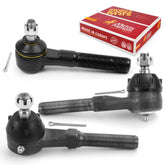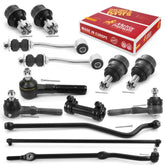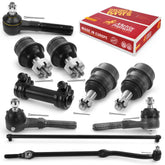Brake Pad Maintenance: Cleaning, Lubrication, and Care Tips
Investing in a good suspension system is important for safety and optimal vehicle performance. Brake pads are critical components that need periodic care and replacement to maintain efficient braking. They convert kinetic energy into thermal energy to reduce speed, creating friction against the rotor when you press the brake pedal. To ensure the optimal performance and longevity of your brake pads, it is important to properly clean and lubricate them. Neglecting this maintenance can result in decreased braking power and premature wear on the pads, which can lead to safety issues and costly repairs. By taking the time to maintain your brake pads, you can save yourself time and money in the long run while also ensuring a safer driving experience. Here are some tips:
How to Clean Brake Pads
To properly access and clean your vehicle's brake components, safely jack up the vehicle and remove the wheel covering the brake assembly. Use a soft-bristle brush or a specifically designed brake dust cleaning tool to gently remove any accumulated brake dust on the pads and calipers. Avoid using harsh materials that could damage the pads or calipers. Consider using a brake-specific cleaning spray to remove any stubborn dirt, grease, or brake fluid, following the product instructions and ensuring compatibility with your brake components. However, excessive water exposure should be avoided as it could lead to rust or compromise the brake's effectiveness. If you do use water, make sure the brakes are completely dry before driving.
Lubrication prevents noise
To ensure your brake system is functioning properly, it's important to apply high-temperature silicone brake lubricant to the caliper slide pins or bushings. This will prevent sticking or binding and allow the caliper to move smoothly. Additionally, applying a thin layer of brake lubricant to the back of the brake pads can help reduce noise caused by vibration between the pads and the caliper or piston. However, be careful to avoid getting the lubricant on the rotor or friction material surface of the brake pad as this could compromise braking performance. Lastly, for brake pads with metal tabs that come into contact with the caliper, apply a small amount of lubricant to these points to prevent noise. By following these steps, you can help maintain the safety and efficiency of your vehicle's braking system.
Some More Tips
It is imperative to always follow the instructions provided by the brake pad and lubricant manufacturers! Using the wrong maintenance approach can cause serious damage to your system. That's why it's crucial to only use high-quality brake cleaning sprays and lubricants specifically designed for braking systems. Don't take any chances with your safety! Visit Metrix Premium Chassis Parts to get the best brake rotors on the market.
Remember, applying too much lubricant can attract dirt and debris, leading to more issues. Opt for a thin, even layer instead. And if you're unsure about the proper cleaning and lubrication procedure, don't hesitate to consult a professional mechanic. Your safety is not something to gamble with!
In conclusion, it is absolutely essential to clean and lubricate your brake components in order to prevent noise, improve brake performance, and extend the life of your brake pads and other components. Neglecting regular maintenance can lead to dangerous situations and compromise the effectiveness of your vehicle's braking system. Therefore, it is of utmost importance to prioritize your vehicle's safety and ensure that its braking system is operating at its best through proper maintenance.









